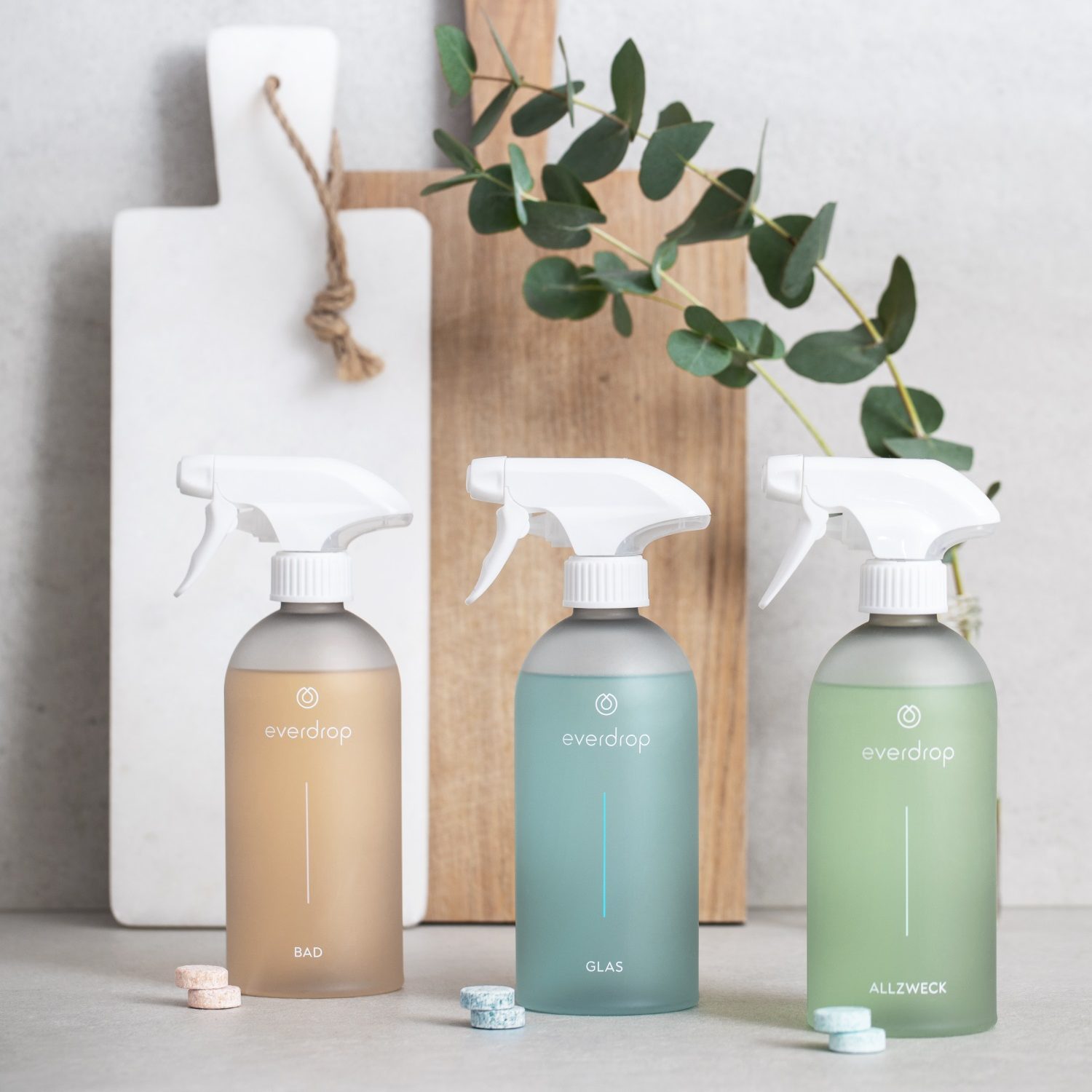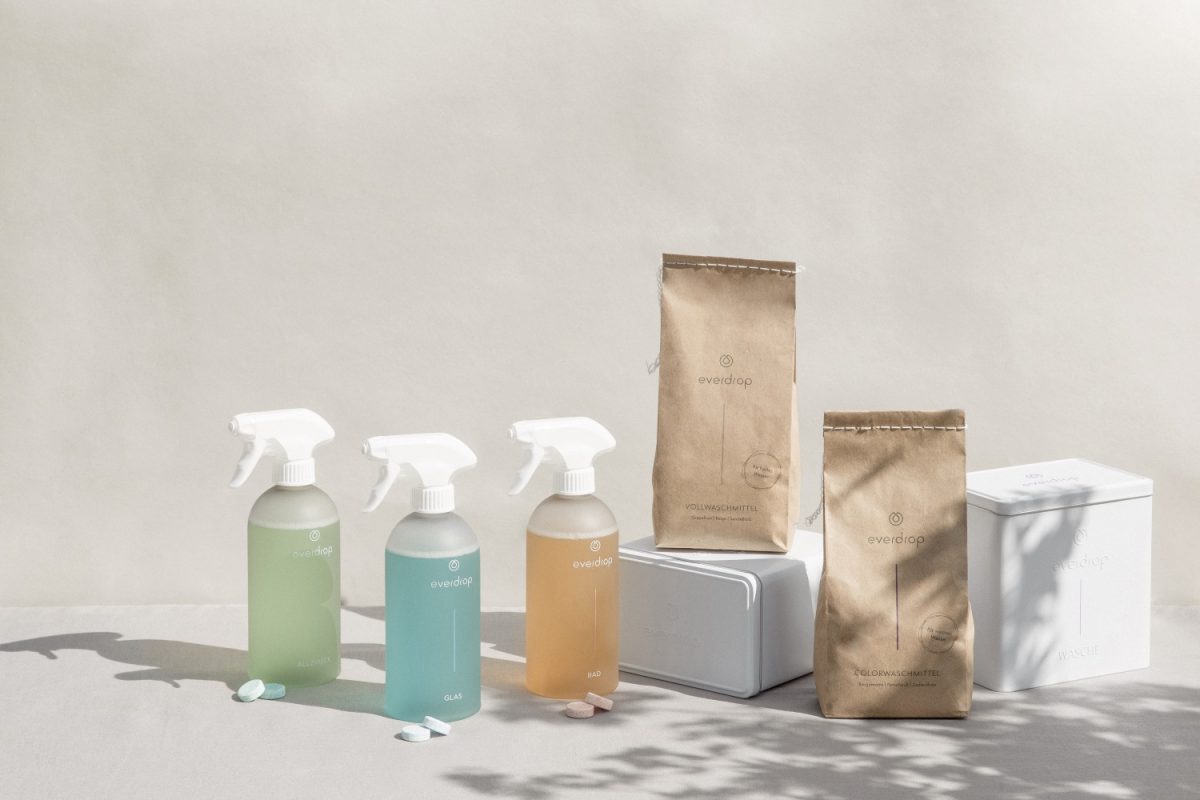According to the Plastic Atlas of the Heinrich Böll Foundation and Friends of the Earth Germany (BUND), more than 8.3 billion tons of plastic were produced between 1950 and 2015 worldwide. The biggest share was made up of disposable products and packaging. One Munich startup that wants to tackle the problem of packaging waste is Everdrop. And their approach is as simple as it is effective: tablets instead of plastic bottles.

What that means in detail: Everdrop offers household cleaning products such as bathroom or all-purpose cleaners in tablet form that can be dissolved in reusable bottles. This lets consumers avoid single-use plastic – because they no longer have to constantly buy new plastic bottles – while also cutting back on CO2 emissions that are generated by the water transported for conventional cleaning products. And they can still clean.
1.3 million single-use plastic bottles avoided
The people behind the company are founders Chris Becker, Daniel Schmitt-Haverkamp and David Löwe. They have been on the market with Everdrop since 2019 and are positively surprised by how popular their product has become:
“To be honest, none of us expected that so many people would want and be ready to change their consumer behavior for sustainable products. If you assume that one tablet avoids purchasing a new bottle of cleaning agent, then as of today we have been able to avoid more than 1.3 million single-use plastic bottles.”
And although their idea is far from new, the zeitgeist is right:
“Chemists had already developed tablets in the 80s. But no one wanted them back then, because plastic bottles filled with colorful liquid were new and much sought after. But things are changing in society. Climate change and the accumulation of waste on our planet have taken on dimensions that make people feel the need to take action.”

The startup recently expanded its portfolio to include a laundry detergent concept. What makes Everdrop detergent innovative is that it’s adapted to suit the degree of water hardness where a consumer lives. That should make it possible to cut back on unnecessary surfactants from laundry. The corresponding water hardness is determined based on a customer’s zip code. The founders are confident about their approach.
“An enormous impact can also be made with laundry detergent. Detergent causes the most chemical contamination in household waste water. With our innovative concept based on water hardness, customers can cut back on surfactants by up to 50 percent just by entering their zip code.”
Greenwashing vs. a sustainability seal
As with any product that claims to be sustainable, the question also naturally comes up for Everdrop: To what extent are the products truly sustainable – apart from the quite obvious aspect that the tablet solution can cut back on a large number of plastic bottles. It’s a question that is also on the founders’ minds:
“The biggest challenge is and remains to this day, in a world full of greenwashing offers, to source the most sustainable components possible for our products.”
According to the startup, their tablets are microplastic-free, vegan and readily biodegradable according to OECD measurement criteria. The Everdrop bottles are made from recycled PET and the tablet packaging is made from used paper. What’s still missing: a sustainability seal. But that’s also something they’re working on, as David Löwe ensured the online magazine Utopia. With the right seal, consumers should be able to clearly recognize that both the production process and substances live up to the demands of environmental sustainability.
“The goal is clear: sustainability unicorn!”
So where is their journey headed?
“The goal is clear: sustainability unicorn! And that all depends on whether or not sustainability as a subject will remain highly relevant to society and therefore determine purchasing decisions. At the moment, all the signs say it will.”
The signals from investors are also looking good. Everdrop recently raised a six-digit sum in a pre-seed financing round. The business angels involved include Christoph Behn from Better Ventures, the Lillydoo founders Sven Bauer and Gerald Kullack and Sebastian Merkhoffer, founder and CEO of Fitvia. With the fresh capital, the Munich startup wants to venture into international expansion and put additional sustainable household products on the market. There is still lots to do – and lots of plastic to be avoid



